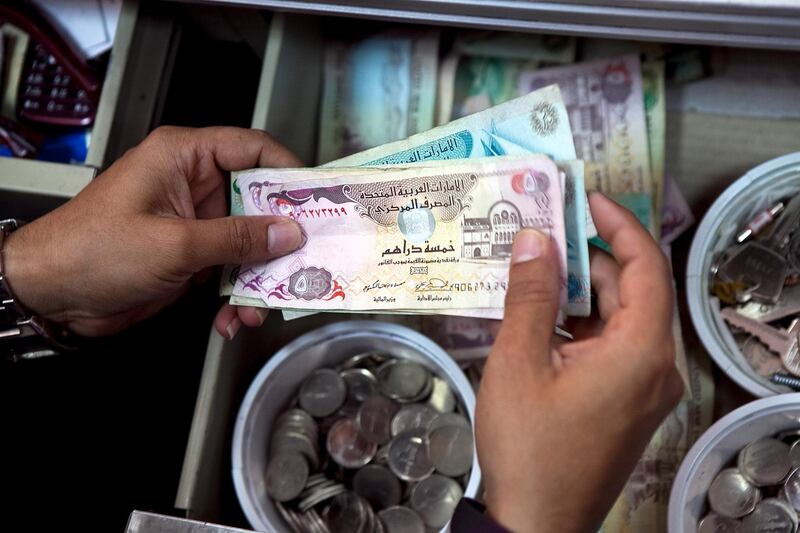Almost 65 per cent of UAE residents are saving less than they did 12 months ago - but the low rate is mainly due to high summer spending, a new study found.
According to yallacompare's latest Consumer Confidence Tracker, almost seven in 10 put away less in the third quarter of 2018, compared to 55 per cent in the previous three months. The financial comparison site attributed this change to the time of the year as the poll of 1,500 was carried out during the summer and back-to-school periods.
"Over the summer, it’s generally accepted that consumers have bigger expenses related to travel during the summer holidays, and back-to-school expenses once the holidays finish. This obviously impacts consumers’ ability to save during this period," said Jonathan Rawling, the chief financial officer of yallacompare.
Despite residents reporting a struggle to save, the tracker also found stable levels of job confidence, quarter-on-quarter, with 62 per cent of respondents expecting a salary increase in the next 12 months.
The UAE has introduced a raft of reforms over the last few months aimed at boosting economic growth, creating jobs and diversifying the economy away from oil income. Measures rolled out include a Dh50bn stimulus package for the emirate of Abu Dhabi, allowing 100 per cent foreign ownership in companies in selected sectors from the end of this year plus more relaxed visa options for professionals, retirees and residents between jobs. The initiatives have strengthened business sentiment in the UAE, which in turn improved job prospects for residents during the third quarter.
Yallacompare said the struggle for residents to save could also be caused by higher living costs with the tracker recording an 11.4 per cent drop in overall financial confidence.
"The introduction of VAT, along with a general increase in the cost of living, has affected some residents’ ability to save as much as they did last year," said Jonathan Rawling, the chief financial officer of yallacompare. "There’s an assumption that, with property prices dropping, the increased cost of living is offset against the decreased cost of housing. However, as our research has shown consistently throughout the year, the majority of UAE residents are either unwilling or unable to take advantage of lower property prices."
____________
Read more:
A fifth of UAE expatriates doubled their salary when they relocated
Is the UAE's new five-year visa a game changer for expat retirement?
Consumer and job confidence is likely to improve this year, survey says
A fifth of UAE tenants are paying more for the same home
_____________
About 53 per cent of those polled are now less confident about their finances than they were 12 months ago. A quarter of those polled said they are struggling to make ends meet and over half said they are worried they cannot get by if the cost of living rises – a 10-percentage point on the number of people that said the same thing in the second quarter of this year.
However, expatriate residents are unlikely to relocate because of their financial concerns. HSBC's Expat Explorer 2018 study found that more than half of UAE expatriates moved to the UAE to increase their income and a fifth of them say their salaries doubled when they relocated to the Emirates.
The UAE is also the fourth best country for economic prospects for expatriates – up one place from last year – with 67 per cent of those polled having “more disposable income thanks to higher earnings and the tax-free environment”, HSBC found.
"Because overall job confidence remains strong in the UAE, expat residents continue to regard the country as more attractive for working in than their home countries would be. The vast majority are either less likely, or as likely, to leave the UAE based on their financial health than they were at this time last year," said Mr Rawling.
The yallacompare study also found that despite a cap on school fee rises in Dubai this year, 83 per cent are now paying more for education than they were 12 months ago and almost half are paying more in rent that they did a year ago.
Steve Cronin, the founder of DeadSimpleSaving.com, said salaries are not keeping pace with cost of living increases, even if those increases are not particularly rapid.
"School fees and rents that are stubbornly not decreasing are making up the majority of expenses, with people reluctant to change schools and homes to get a reduction," he said. "Many people then are reducing their savings rather than reducing their expenses, which is exactly the opposite of what they should do for long-term prosperity."
While the majority of non-Emirati residents regularly send money to their home countries, almost four in 10 are sending less than they did last year and 37 per cent said they save money regularly compared to 43 per cent in the second quarter of the year.
Demos Kyprianou, a business psychologist and board member of SimplyFI.org, says he encounters many residents struggling with the unexpected challenges of life at meet-ups hosted by the non-profit community of UAE investment enthusiasts.
"Credit seems to be a common solution here rather than forward planning/ budgeting or setting up a three to six month emergency fund," he said. "The more proactive people are, the more likely they will be ready for when things do get tight."
Mr Kyprianou said while many residents know how to reduce expenses to increase their savings, using measures such as downgrading the supermarket they shop at or the location and size of their residence, they do not always want to live more frugally.
"It's the emotions associated with the downgrade that make it difficult, for example the feeling of needing to keep up with the Joneses, wanting to maintain the level of comfort they currently have," he said. "The most elusive problem is people don't tighten their belts when times are good. They wait until the times are not so good to do so. By then it is sometimes too late."







